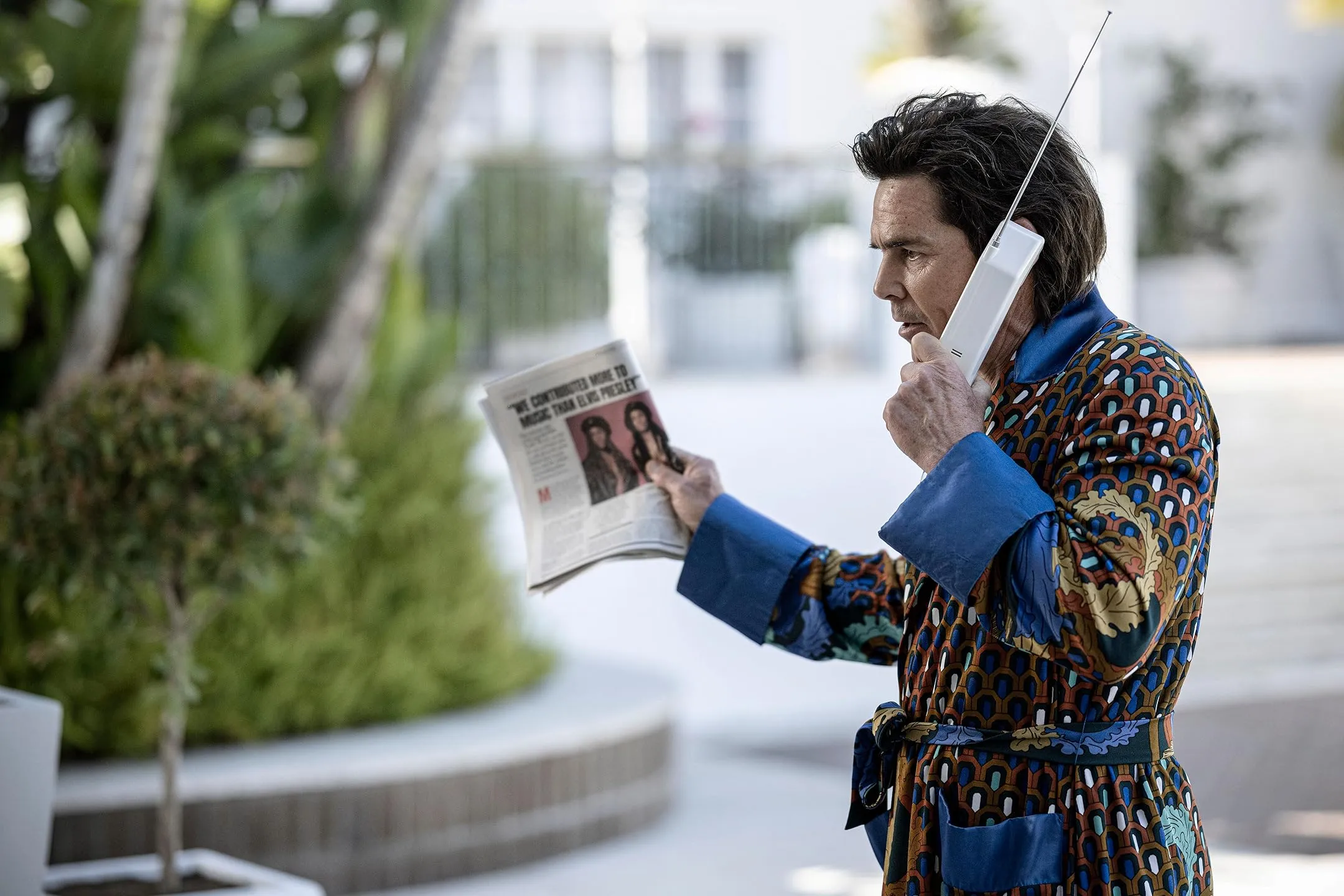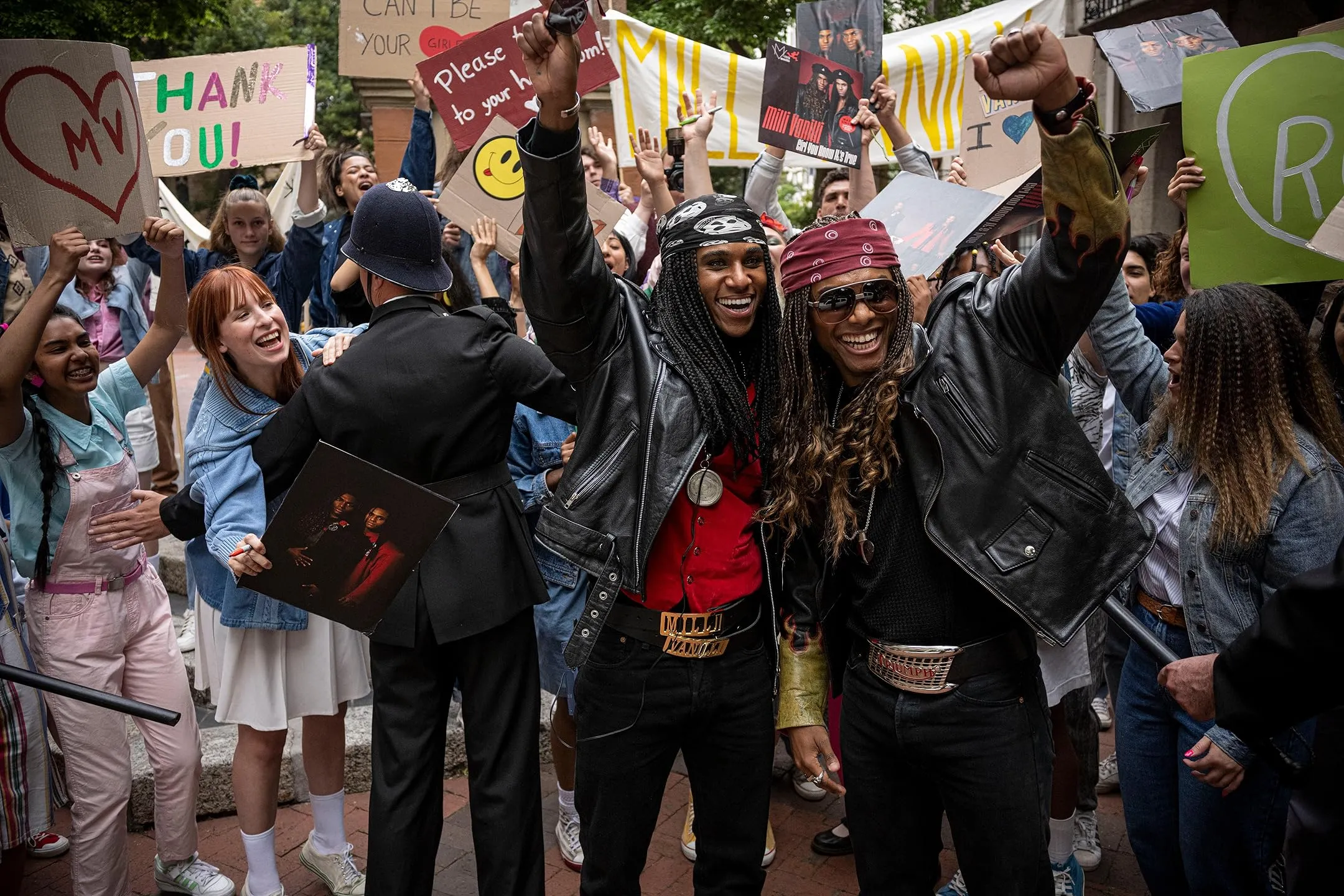The film Girl, You Know It’s True shares the wild true story of pop sensation Milli Vanilli. Directed by Simon Verhoeven, it recounts how Rob Pilatus and Fab Morvan unexpectedly shot to fame in the late 80s through a musical deception that ultimately crashed down around them. At its core, the story remains as shocking now as it was back then.
Rob and Fab were talented dancers with musical aspirations but lacking vocal skills. When ambitious producer Frank Farian ‘discovers’ them, he envisions using their dynamic stage presence to market pre-recorded tracks by session singers. Assured this ruse offers the fast track to stardom they crave, the young men agree to lip-sync Farian’s songs as the new act, Milli Vanilli.
The plan succeeds beyond anyone’s expectations. Milli Vanilli’s catchy hits and high-energy live shows make them an overnight global phenomenon. But as fame and fortune wildly exceed all involved ever dreamed, uncomfortable truths slowly emerge.
Tensions build between the duo and Farian’s controlling leadership. And when technology betrays them with a backing track malfunction, it becomes undeniably clear Rob and Fab have merely been the smiling public faces of a calculated marketing scheme.
Verhoeven’s film sets out to shed light on this madcap fall from grace. If sometimes overly glossy, it offers audiences an entertaining look back at one of pop’s most absurd scandals through the lens of the dynamic duo at its center.
Rise and Fall of a Pop Phenomenon
We’re introduced to Rob and Fab, two ambitious young men with dance skills but lacking vocal talent. Rob hails from Germany by way of America, having been adopted as a child, while Fab is French. The two bond over their love of dance and dreams of making it in the music industry.
Enter Frank, a seasoned German producer still trying to replicate his past disco successes. He sees in Rob and Fab the charisma and style needed to sell his latest track. What they don’t have is the ability to actually sing the song. Frank assures the duo this won’t matter—with his guidance and their looks, they’ll be huge through lip-syncing alone.
And huge they become. Practically overnight, Milli Vanilli and their catchy single are dominating charts worldwide. Rob and Fab are thrust into a whirlwind of fame, playing sold-out arena shows and rubbing shoulders with celebrities. But behind the scenes, tensions are mounting. Frank micromanages their every move, and the deception of their lip-syncing begins to weigh on Rob and Fab.
The facade finally comes crashing down during a live performance. When their backing track malfunctions, their lack of singing talent is exposed for all to see. In the aftermath, Milli Vanilli is stripped of their Grammy award by the outraged music industry. While Frank escapes relatively unscathed, for Rob and Fab, the fallout is devastating. Rob in particular struggles with his new pariah status, turning to drugs and dying young.
It’s a story of how far ambition can take you, but also a warning about the price of building success on dishonest foundations. Though short-lived, Milli Vanilli still left an indelible mark on late-80s pop culture.
Breaking Down the Characters
The leads in Girl You Know It’s True deserved a lot of praise. Tijan Njie and Elan Ben Ali absolutely nailed their roles as Rob and Fab. Not only did they look eerily like the real duo, but they really breathed life into them. You really got a sense of their energy, ambition, and strong bond. Even when things start spiraling, you understand what drives them. These guys should be proud of the complex, nuanced performances they brought to the screen.
In contrast, some of the supporting roles fell flat. They often felt like caricatures. Take the record executives—all they did was laugh and joke around like cartoon villains. We know these people profited majorly from Milli Vanilli’s success. They had to know the truth too. So why let them off so easy? A few comical scenes don’t cut it. A deeper look at their culpability would have taken the story to another level.
And then there’s producer Frank. Played well by Matthias Schweighofer, for sure. But he also got off pretty lightly. Yes, he had major talent in discovering their image and concept. But launching a whole act on pure deception? Manipulating two young men’s careers that way? There had to be more questions asked of this man. The film shows him as ultimately harmless, when really he was the architect of the whole charade. Diving deeper into his character’s mindset and motivations could have provided real insight.
Don’t get me wrong—Rob and Fab will always be the heart of this story. But for a film exploring such important issues around truth and responsibility in the industry, not holding more people to account was a major missed opportunity. The complexities deserved more exploration to do justice to the real-life impacts. With richer characters all around, it could have been so much more than just a glimpse at headlines.
Getting the Details Right
Director Simon Verhoeven did a solid job bringing the wild story of Milli Vanilli to the screen. For the most part, he stuck closely to what really went down in recreating the key events. It’s obvious he spoke to many involved too, because some lesser-known pieces came through clearly.
You really got a sense of Rob and Fab’s rise from the start. Seeing them go from breakdance crews to dancing in videos, then getting “discovered” by Frank—it all felt genuine. Verhoeven also knocked it out of the park with recreating the over-the-top music videos and performances from the era. From the costumes to choreographed moves, he transported you straight back to the late 80s.
Where the film falls down somewhat is filling in the wider context missing between these moments. Yes, the core facts are there about the lip-syncing deception. But so much more could have been said about the imperial nature of the music industry back then. How two young men of color ended up as puppets for powerful white executives. What that says about creativity vs. commerce?
Some more psychological insight into why the different players felt they needed to protect the sham for so long also would have added real depth. As it is, we only scratch the surface of such an intriguing saga. More commentary was needed to do full justice to its cultural and social importance.
Overall, Verhoeven delivered a generally entertaining look at a unique musical story. But by not peering deeper into its inherent themes and issues, it missed a chance at true greatness. The larger lessons of the Milli Vanilli experience remained tantalizingly out of reach.
Finding Deeper Truth
This film tells a wild story that really lends itself to comparison. While it hits some of the usual biopic beats, diving deeper may have served it better.
Take the documentary “Milli Vanilli”—it p provides necessary extra context missing here. We learn so much about the systems that failed Rob and Fab, from racism in the industry to those who profited from their downfall. Seeing both works, it’s clear there was deeper truth left untapped.
In a sense, it channels the glossy spirit of musical biopics like “Rocketman.” It captures an icon’s meteoric rise and fall through drama and music. But where films like that also offer psychological insight, this often stays surface level. We see actions more than understanding motivations.
A miniseries possibly could have fleshed things out more. There was room to truly unpack each player’s perspective, from the duo to Farian to the executives. More time would allow showing how systemic dynamics actually damaged lives.
As it stands, some complexity gets sacrificed for momentum. But the raw materials were here for sincere examination of fame, fraud, and human cost. A longer format may have granted the sensitivity and commentary it at times seemed on the verge of achieving.
The film entertains but leaves you wanting more meaningful grappling with its thought-provoking true story. In the end, it hints at depths that this intriguing saga deserved to plumb fully.
Capturing the Spirit, Missing the Substance
Fans of Milli Vanilli’s brief moment in the sun will find something to appreciate in Girl You Know It’s True. It succeeds in recreating the flashy excess and over-the-top drama that surrounded the duo’s stratospheric rise and fall. Tijan Njie and Elan Ben Ali shine as Rob and Fab, immersed in the roles. You can’t help but get swept up in the spectacle as their story plays out.
However, the film leaves you wanting more beneath the surface. It skims over complex issues like race and how the pair were used. If you seek deeper truths about the people and forces that shaped events, look elsewhere. The documentary provides stimulating context absent here. We learn little about Rob and Fab beyond surface traits. More could have fleshed out their humanity.
Minor characters likewise lack dimension. Figures like producer Frank Farian feel one-note where there were likely nuances. A longer format may have given space to build them as fully-rounded individuals. The potential was there to examine multiple viewpoints thoughtfully.
Overall, it’s an enjoyable popcorn movie retelling of Milli Vanilli’s flashy comeuppance. Director Simon Verhoeven captured the fun and frivolity. But those seeking insight will find it a superficial dramatization. The story cried out for sensitive handling of its thornier themes around celebrity, deception, and marginalization.
As such, film fans curious about the saga may want that documentary for a more considered treatment. Whereas this is best seen as light entertainment that leaves important facets unexamined. It makes for an entertaining ride but ultimately proves too shallow in mining the deeper implications of its fascinating source material.
Faded Glory, Timeless Lessons
To recap, Girl You Know It’s True tells a glittering story of sudden fame, drugs, and disgrace and does it with plenty of nostalgic flair. Director Simon Verhoeven succeeded in recreating the glitz and grit of Milli Vanilli’s swift ascent and fall. Tijan Njie and Elan Ben Ali led the way as entertaining leads who channeled the duo’s boundless charisma.
However, deeper insights were left wanting. Complex issues around race, greed, and manipulation got short shrift. More psychological heft could have imbued two-dimensional characters with nuance. Opportunities existed to probe provocative questions the real-life saga posed but were missed.
Still, one can’t deny the film sparked fond memories of an unabashedly commercial era. It rode a wave of revivalist fervor for music that soundtracked youth. Perhaps some came seeking guilty thrills of drama, duplicity, and delicious downfalls. In revisiting faded dreams of fame, they found traces of innocence regained.
Over three decades on, the fundamental appeal endures—music as an escape, nostalgia for summer’s gold. But so too does the story’s continued ability to start important conversations. Maybe now, with more self-awareness, we can delve deeper and learn life’s lessons—about race, mental health, the manipulations of industry, and the dangers of unrealized dreams. Though stylized, Girl You Know It’s True ensures this cautionary pop parable refuses to fade from relevance. The ghosts of Rob, Fab, and their gilded guise may walk among us yet.
The Review
Girl You Know It's True
Girl You Know It's True told an entertaining, if superficial, retelling of Milli Vanilli's sensational rise and fall. It succeeded in recreating the flash-fried spectacle of their meteoric fame, fueled by great lead performances and nostalgic flair. However, the film only grazed the intriguing complexities of the real-life story and missed opportunities to probe deeper issues. While it sparked reminiscing of an unabashedly commercial era, Girl You Know It's True settled for style over substance where richer insights were possible.
PROS
- Captured the glamour and excess of Milli Vanilli's heyday
- Strong central performances from Tijan Njie and Elan Ben Ali
- Evoked nostalgia for 1980s pop music and culture
CONS
- The plot was superficial and did not delve deeply into complex themes.
- Supporting characters lacked depth and dimensionality.
- Missed chances for social commentary on race, industry practices






















































Discussion about this post